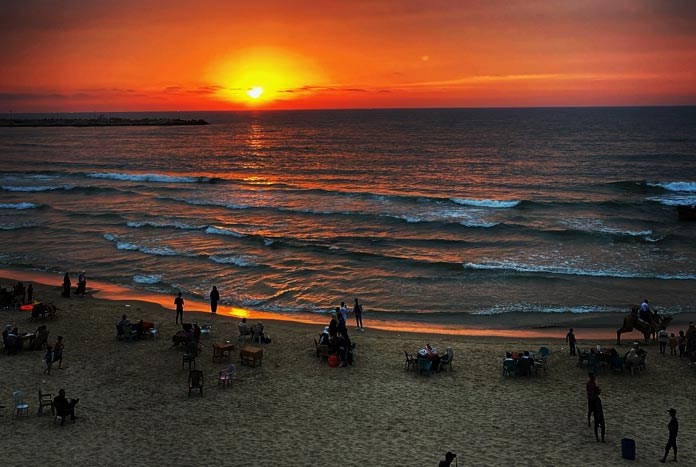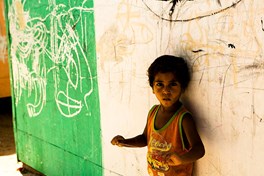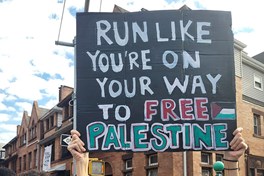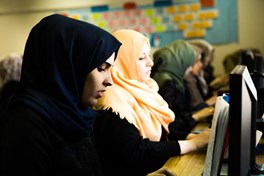In May this year, after securing hard-to-obtain visas, some of the Amos team were able to enter Gaza and visit NECC and Al Ahli Hospital.
It was a fantastic opportunity to reconnect with old staff, meet new team members, and hear about this work’s impact on the lives of women and young people in Gaza. Before we visited Gaza, we also caught up with our partner Alrowwad in Aida refugee camp in Bethlehem. We wanted to take this opportunity to share in a little more depth what these three incredible organisations are up to and what a difference your generosity makes.
Alrowwad Cultural & Arts Society
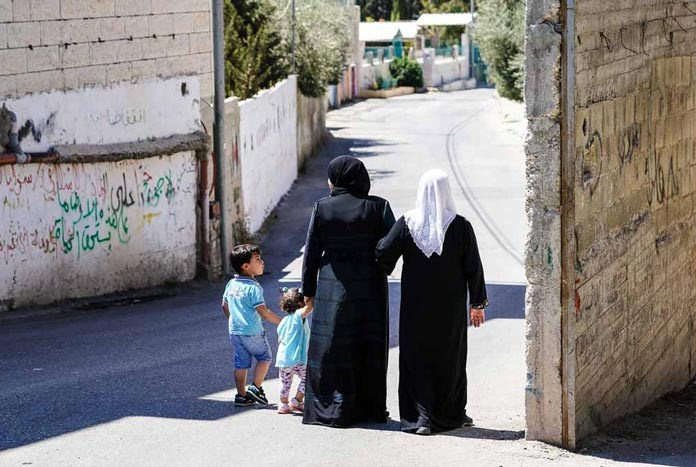
Generations: A family walking through a refugee camp in Bethlehem, Palestine
— — — — — — —
Alrowwad Cultural & Arts Society in Aida camp in Bethlehem is a safe, highly-supportive space where children and young people can study and channel their dissatisfaction into learning and creativity. The camp is densely overcrowded, and the Centre provides a vital space where children can access books and computers and receive individual educational support in the library.
The rest of the Arts Centre is used for teaching young people music, dance, drama, film and photography so that they can express themselves and channel their frustration and anger into constructive activities.
The demand for Alrowwad’s programmes meant it had outgrown the original Centre. So, five years ago, they set about a major capital project to build a new eight-storey building which would act as a youth training centre, community cafe and accommodation for tourists that would provide a sustainable income.
Israeli Defence Force soldiers regularly raid Aida camp. Alrowwad’s new Centre is one of the highest buildings in the area, and late last year, soldiers broke in and sent snipers onto the top floor to terrorise and shoot at people below. When they were on the roof, they maliciously smashed some of the solar panels, power converters and batteries. Unfortunately, there is no insurance cover for damage like this, and Alrowwad could not pay for the vital repairs.
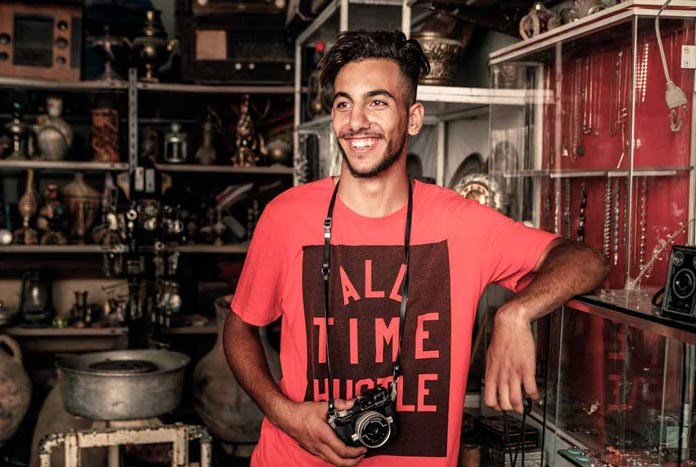
Creativity: At Alrowwad, photography is used so that the young people can express themselves and channel their frustration and anger into something constructive
— — — — — — —
Without the solar panels, the cost of running the Centre is prohibitive, so Amos Trust was pleased to help replace damaged panels, as well as help to meet the staff costs for running their youth arts programmes.
We visited the Centre several times during our time on the West Bank. Each time, young people were in every room, accessing the library and IT equipment, having dance classes and editing footage they had filmed. Of course, some young people were not involved in the sessions; instead, they were hanging around chatting as it was so obviously a safe, creative place where they felt valued. The staff reported how their regular programmes were proceeding as planned but that they’d also been responsible for running a Cultural Festival alongside the Bethlehem Marathon and had established a new journalism course.
“The last two years have been so hard for us, but we do not have the luxury of despair. We want to widen the horizons of young people. Even though this is a terrible situation, as long as we live in it, we want to make it the best we can and leave a better future for our children. I am very excited about our new journalism diploma. It is important to create and tell positive stories to show who we are, and we must now narrate our own stories, not just rely on other people’s narratives.”
Abdelfattah Abusrour, founder and director of Alrowwad
Read more about Alrowwad.
— — — — — — —
NECC
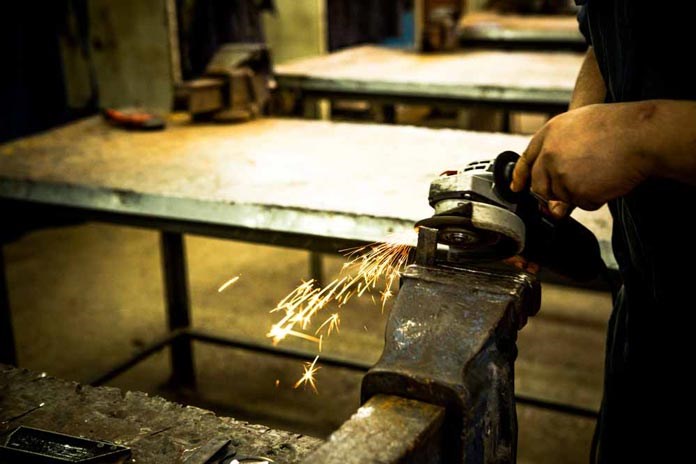
Alternative approaches: NECC offers carpentry and metal work for 14-17-year old young men who cannot stay in school
— — — — — — —
NECC offers vocational training and educational opportunities to young Gazans unable to find work. Youth unemployment rates are currently over 70% in the Gaza Strip; this figure is around 60% for university graduates.
NECC’s training programme is divided into four areas:
- carpentry or metal work for 14-17-year old young men who cannot stay in school
- electrical engineering, air conditioning or solar panel installation and maintenance training for 18+ men
- dressmaking and tailoring for 16+ young women
- secretarial skills and graphic design training for 18+ women.
The employment rates for young men who have taken part in the practical vocational training courses at NECC are staggering. For example, one year after graduation, 80-85% of air-conditioning graduates are in employment, with high rates for other courses too: welding 75% and carpentry 65%. This is thanks to NECC’s close relationship with employers, which allows them to keep their training relevant.
Abu Ouda, the lead trainer on the young men’s vocational training courses, explained that “before now, people didn’t give these sorts of jobs so much respect, but that is changing.”
Finding the slim opportunities which do exist for work in Gaza is essential for these young men. Alongside the vocational training, NECC offers them weekly psychosocial support which is run by their own staff in partnership with other organisations. They help manage their feelings of isolation, anger and grief whilst allowing them to stay engaged in their training.
The young women who are training to become graphic designers with NECC are already generating income online. The beauty of training in digital skills is that the borders of Gaza and the dire local labour market form less of a physical barrier to opportunity. Trainees told us that they were taking on design work remotely for clients from across the Arabic-speaking world, including the UK.
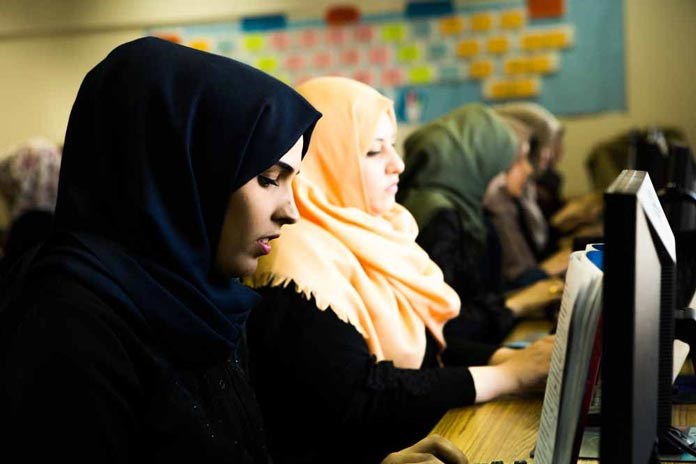
No borders: Young women who are training to become graphic designers with NECC are already generating income online
— — — — — — —
Freelance graphic design work is particularly appealing to the women in the class who are mothers, as they can fit it around family life. “I have a degree in pharmacy, but there are no jobs for me in Gaza, so I came to NECC”, says Arij. “I want to do graphic design because I can freelance; I love drawing, and this is an amazing experience. I believe I can get work freelancing.”
In addition to the vocational education and training programme, NECC focuses on early years health clinics, and children’s well-being centres are a key priority. We sat in on a psychosocial support session for mothers of children attending the children’s centre. They were participating in a session on how to identify the symptoms of trauma in their children, be it emotional, physical or behavioural.
Through the use of music and games, the group builds trust and rapport with each other. A simple activity of blowing up and then popping balloons to create a loud noise was used as an example of how to help their children work through some of the trauma they experienced during last year’s bombing raids.
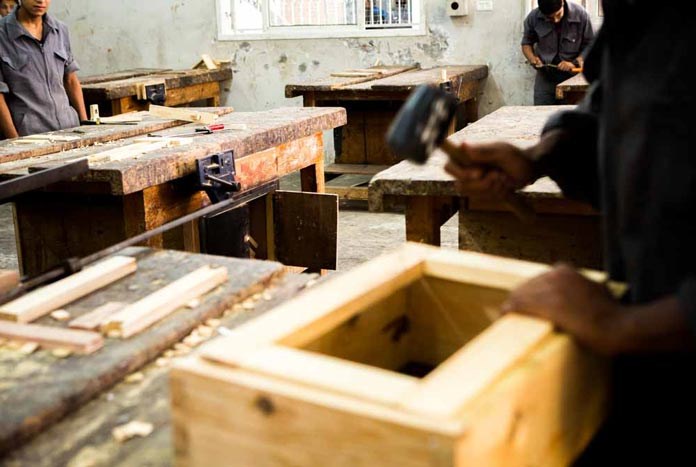
Good prospects: Although unemployment in Gaza is high, opportunities for those that complete vocational courses are good thanks to NECC’s close relationship with employers
— — — — — — —
The women shared that they talk with their husbands about what they have learnt after participating in these sessions. “This group is like a family to us”, they explained, “we can support each other because we live close to each other.”
“It is not only our children who feel fear when the fighter planes and drones come over,” explained one group member. “We too remember the past and are taken back to it when we hear rockets or sudden sounds.”
Another mother told us: “I am a widow and the mother and father to all my children. I bring them here, as there’s lots of information to help them. For example, I now know that when my children have nightmares [after an event], I recognise the trauma symptoms and can bring them here for help. I know how to deal with and reassure my children during a traumatic event. Before, I was crying and afraid in front of my them. Now I know relaxation techniques and how to distract them from the outside environment as best I can.”
Read more about NECC.
— — — — — — —
Al Ahli Arab Hospital
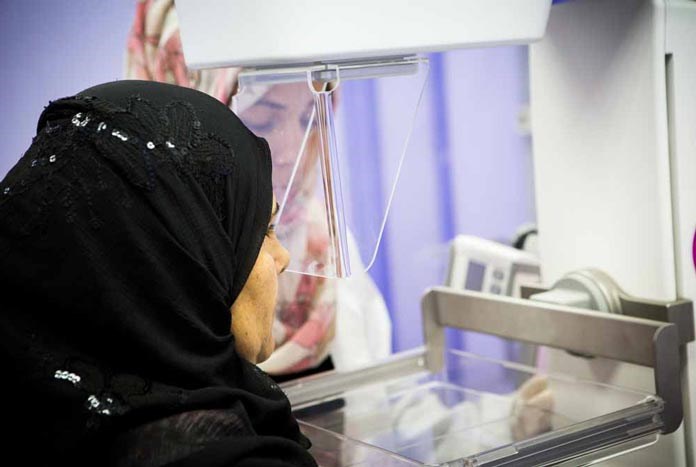
A holistic approach: The screening programme consists of a clinic where women receive mammograms and are taught about self-examination.
— — — — — — —
Amos Trust supports Al Ahli Hospital’s breast screening programme through our Women 4 Women campaign. Breast cancer accounts for over 32% of women’s cancer cases. It kills more women than any other form of cancer in Gaza, and women there are three times more likely to die from breast cancer than in the UK.
Some of the reasons for this include the social stigma around breast cancer and the fear and shame which prevents women from presenting for screening when they find a lump. According to Islamic Relief’s report ‘Mapping Study for Cancer Care in the Gaza Strip’: “Barriers to cancer-seeking behaviour, the patients are afraid of unexpected results, or fearful of social stigma, or emerging family problems (the husband may remarry if his wife has breast cancer).”
Such stigma leads to many late diagnoses. Women often need radiotherapy when breast cancer is detected at the later stages, which presents considerable complications in Gaza. Radioisotopes, which are integral to radiotherapy treatment, are forbidden entry into Gaza by the Israeli authorities. This means patients must travel to Jerusalem for treatment; they must try to obtain a visa to leave Gaza and then travel alone to receive treatment, often leaving their children at home.
One woman, Nadaa, told us that during 52 days of the 56 days she was in Jerusalem for treatment for breast cancer, the 52-day-long 2014 attack on Gaza took place. She had left her two young daughters with her father. She talked of her fear for them all whilst receiving this brutal treatment.
The time taken to get a visa will further delay access to treatment, meaning that the cancer may have spread. According to the World Health Organisation, in 2019, there was only a 65% approval rate for visas by Israeli authorities. Other treatments like chemotherapy are often unsuccessful as the courses are interrupted due to a lack of medication because of the blockade. The consequence of late diagnosis and limited medical options is a much higher number of double mastectomies with all the complications this entails.
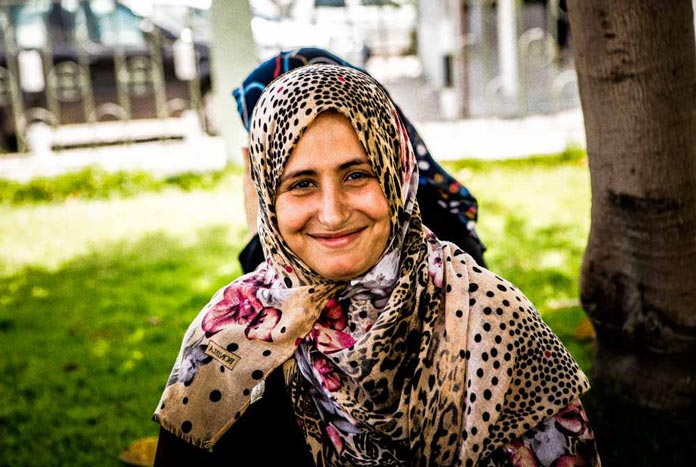
Women 4 Women: Amos Trust supports Al Ahli Hospital’s breast screening programme
— — — — — — —
Al Ahli is determined to screen as many women over 40 as possible, ensuring earlier detection of breast cancer and thus a better prognosis. The staff seek to educate 5,000 women yearly about breast cancer through their community-based awareness-raising programme. They aim to provide annual screening for 3,000 women. Around 350 women a year get breast cancer in Gaza, of which around 50 will attend Al Ahli Hospital.
The programme is built around Al Ahli’s partnership with 35 local community groups throughout the Gaza Strip and the creation of local grassroots support groups. The hospital believes the critical first step is to break the taboos around breast cancer for both women and men. The ‘challengers’, as they call the women who find they do have breast cancer, play a vital role in educating people within their communities about the importance of early detection.
The screening programme consists of a clinic where women receive mammograms and are taught about self-examination. Women with suspicious lumps are immediately offered ultrasound and surgical consultation, followed by a ‘Trucut’ biopsy to confirm a diagnosis. The hospital will provide the appropriate course of action if a woman has a positive diagnosis. If she needs radiotherapy (outside of Gaza), they will recommend visas and put her in touch with local groups to help with transport and support.
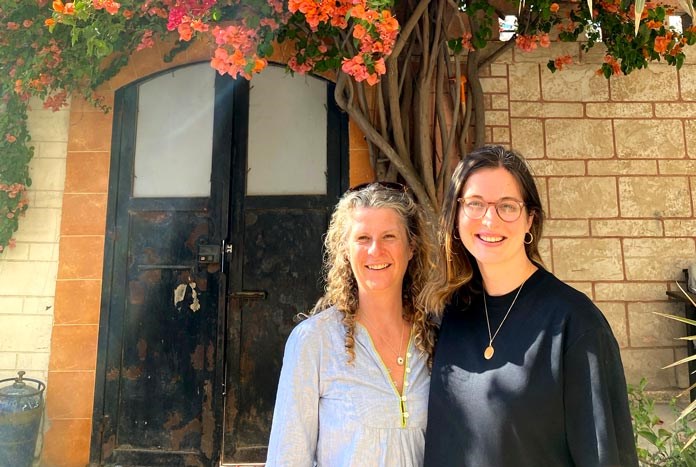
Katie Hagley and Karin Joseph from Amos Trust in Gaza City, May 2022
— — — — — — —
On our visit, we were particularly impressed with the holistic care supplied by the Health, Mind and Body clinics and their practitioners. All the women who receive a positive diagnosis of breast cancer through Al Ahli (about 340 per year), are offered a place in this group which meets twice a week for 2 hours. Women are offered psychological support and education around self-care methods such as massage.
The group provides an incredible support network and helps women to socialise again; as Leila told us: “Before I felt isolated, always worried, under pressure, crying, no one to talk with. There are many faces here, and my social situation has changed.” Another group member told us: “Sometimes we are happy together, sometimes we cry together, we feel comfortable. We are fearless and not lonely.”
Read more about Al Ahli Hospital.
— — — — — — —
If you want to hear more about how you can get involved in the Women 4 Women campaign and support our breast screening programme in Gaza this autumn and Christmas, please contact [email protected]
